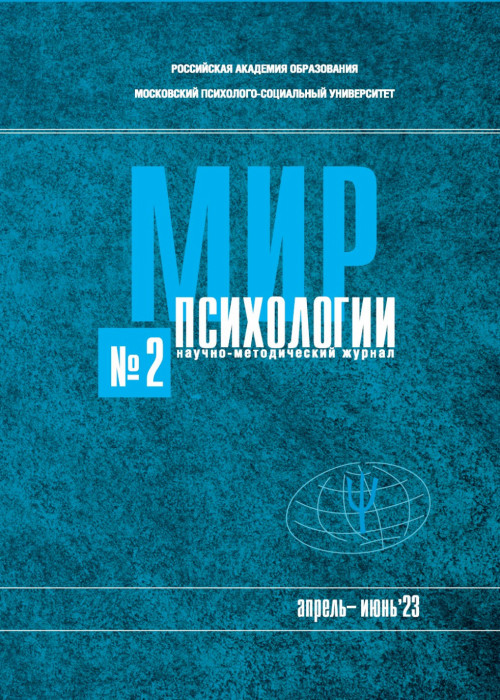Published Date: 01.04.2023
Teachers’ Readiness for Creative Interaction as a Condition for the Success of Studying Lyric Poetry with Adolescents
Annotation
The problem of pedagogical attitude is considered in relation to developing teenagers’ comprehension of lyric poetry. Teacher’s readiness for creative interaction is presented as a leading condition for effectively organizing the process of studying lyric poetry, contributing to the personal and cognitive development of students, the disclosure of their creative potential. More specific attitudes of the literature teacher are singled out, which can either contibute to the process of subject-semantic communication during poetry lessons or, on the contrary, block it.
Keywords
| Type | Article |
| Information | WORLD OF PSYCHOLOGY № 02/2023 |
| Pages | 165-172 |
| UDK | 159.9 |
| DOI | 10.51944/20738528_2023_2_165 |
Library
1. 19. Xerri, D. “Poems look like a mathematical equation” : Assessment in poetry education / D. Xerri // International Journal of English Studies. — 2016. — Vol. 16, № 1. — P. 1–17. — DOI: 10.6018/ijes/2016/1/235261
2. 18. The effect of poetry reading on self-concept of primary adolescents / S. Shahrabady, S. Gholami, S. Afsharloo [et al.] // International Journal of Adolescent Medicine and Health. — 2020. — Vol. 33, № 6. — P. 457–461. — <a href="https://doi.org/10.1515/ijamh-20" target="_blank">https://doi.org/10.1515/ijamh-20</a>
3. 17. Sigvardsson, A. Don’t Fear Poetry! Secondary Teachers’ Key Strategies for Engaging Pupils With Poetic Texts / A. Sigvardsson // Scandinavian Journal of Educational Research. — 2019. — Vol. 64, № 6. — Р. 953–966. — DOI: 10.1080/00313831.2019.1650823
4. 16. Sigvardsson, A. Teaching poetry reading in secondary education: findings from a systematic literature review / A. Sigvardsson // Scandinavian Journal of Educational Research. — 2017. — Vol. 61, № 5. — P. 584–599. — DOI: 10.1080/00313831.2016.1172503
5. 15. Höglund, H. Engaging with Poetry on the Wall : Inviting, seizing, intensifying, and transforming literary engagements / H. Höglund, S. Jusslin // International Journal of Education and the Arts. — 2022. — Vol. 23, № 10. — DOI: 10.26209/ijea23n10
6. 14. Harris, K. L. The practices of exemplary teachers of poetry in the secondary English-language arts classroom : Diss. ed. / K. L. Harris. — Boston : Boston University, 2018. — 222 р. — URL: <a href="https://hdl.handle.net/2144/32689" target="_blank">https://hdl.handle.net/2144/32689</a> (date of the application: 24
7. 13. Diehl, M. B. The Trouble with Poetry : Teachers’ perceptions on poetry teaching and learning in the secondary classroom / M. B. Diehl // Imagining Better Education : Conference Proceedings 2020. — Durham, 2021. — P. 22–34.
8. 12. Creely, E. “Poetry is dying” : Creating a (re) new (ed) pedagogical vision for teaching poetry / E. Creely // Australian Journal of Language and Literacy. — 2019. — Vol. 42, № 2. — P. 116–127.
9. 11. Ariyanto, S. Using intercultural rhetoric to teach poetry : An innovative reading task to build students’ critical thinking / S. Ariyanto // TESOL Journal. — 2021. — Vol. 12, № 1. — Р. 1–5. — DOI: 10.1002/tesj.524
10. 10. Узнадзе, Д. Н. Психология установки / Д. Н. Узнадзе. — Санкт-Петербург : Питер, 2001. — 416 с.
11. 9. Рубинштейн, С. Л. Основы общей психологии : в 2 т. / С. Л. Рубинштейн. — Москва : Педагогика, 1989. — Т. 2. — 328 с.
12. 8. Российская Федерация. Правительство. Об утверждении федерального государственного образовательного стандарта основного общего образования : Приказ М-ва просвещения РФ от 31.05.2021 № 287. — URL: <a href="http://publication.pravo.gov.ru/" target="_blank">http://publication.pravo.gov.ru/</a> Document/View/0001202107
13. 7. Психологические особенности ориентации педагогов на личностную модель взаимодействия с детьми / под ред. В. Г. Маралова. — Москва : Академический проект, 2020. — 288 с.
14. 6. Миронова, К. В. Актуальные проблемы подготовки учителей-словесников к изучению лирической поэзии с подростками / К. В. Миронова // Доклады Научного совета по проблемам чтения / Российская академия образования. — Вып. 19. По материалам Постоянного Кругл
15. 5. Миронова, К. В. Психодидактические основы становления у подростков способности к пониманию лирической поэзии / К. В. Миронова // Перспективы науки и образования. — 2021. — № 6 (54). — С. 330–341. — DOI: 10.32744/pse.2021.6.22
16. 4. Горовая, В. И. Творческий потенциал личности и его развитие / В. И. Горовая, Н. Ф. Петрова // Вестник Университета (Государственный университет управления). — 2013. — № 11. — С. 135–139.
17. 3. Гиршман, М. М. Литературное произведение : Теория художественной целостности / М. М. Гиршман. — 2-е изд., доп. — Москва : Языки славянских культур, 2007. — 560 с.
18. 2. Борзова, Т. В. Условия развития смыслового понимания информации в процессе обучения / Т. В. Борзова, Л. А. Мосунова // Science for Education Today. — 2020. — Т. 10, № 1. — С. 7–24 — DOI: 10.15293/2658-6762.2001.01
19. 1. Асмолов, А. Г. Культурно-историческая психология и конструирование миров / А. Г. Асмолов. — Москва : Изд-во Института практической психологии ; Воронеж : МОДЭК, 1996. — 768 с.
The full version of the article is available only to subscribers of the journal
